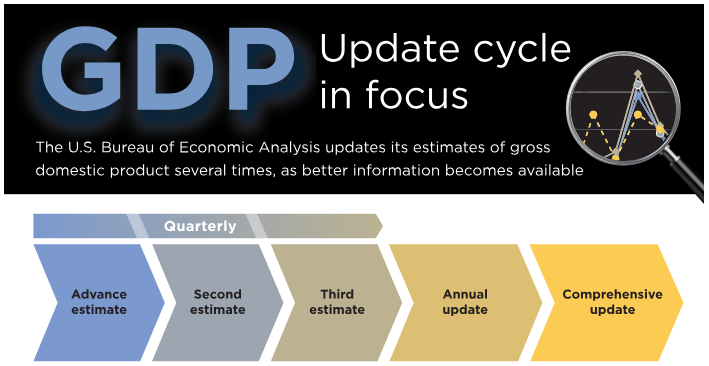Bureau of Economic Analysis
Annual Update of GDP, Industry, and State Statistics Starts Sept. 25
Release of the annual update of gross domestic product and related statistics, including GDP by industry, begins Sept. 25. Updates of state and county statistics start Sept. 26.
Regular annual updates enable the U.S. Bureau of Economic Analysis to refine our estimates as more complete source data become available. They are also a time to bring in improvements in methodology and presentation. This year, we'll introduce data on business investment in data centers.
Principal Federal Economic Indicators
Noteworthy
The Latest
Personal Income by State, 2021 (Preliminary) and 4th Quarter 2021
State personal income increased 7.4 percent in 2021 after increasing 6.6 percent in 2020. In 2021, increases in earnings, transfer receipts, and property income (dividends, interest, and rent) contributed to personal income growth in all states and the District of Columbia. The percent change in personal income across all states ranged from 9.6 percent in Idaho to 4.5 percent in Vermont.
Arts and Culture Economy Declines 6.4 Percent in 2020
Arts and cultural economic activity decreased an inflation-adjusted 6.4 percent in 2020, after increasing 3.4 percent in 2019, according to statistics released today by the U.S. Bureau of Economic Analysis.
Arts and cultural economic activity accounted for 4.2 percent of gross domestic product (GDP), or $876.7 billion, in 2020, the Arts and Cultural Production Satellite Account shows.
Arts and Cultural Production Satellite Account, U.S. and States, 2020
The Arts and Cultural Production Satellite Account released today by the U.S. Bureau of Economic Analysis (BEA) shows that arts and cultural economic activity, adjusted for inflation, decreased 6.4 percent in 2020 after increasing 3.4 percent in 2019. Arts and cultural economic activity accounted for 4.2 percent of gross domestic product (GDP), or $876.7 billion, in 2020.
2021 Trade Gap is $861.4 Billion
The U.S. international trade deficit increased in 2021 according to the U.S. Bureau of Economic Analysis and the U.S. Census Bureau. The deficit increased from $676.7 billion in 2020 to $861.4 billion in 2021, as imports increased more than exports. The goods deficit increased $169.4 billion in 2021 to $1,091.4 billion. The services surplus decreased $15.3 billion in 2021 to $230.0 billion. The goods and services deficit was 3.7 percent of…
January 2022 Trade Gap is $89.7 Billion
The U.S. monthly international trade deficit increased in January 2022 according to the U.S. Bureau of Economic Analysis and the U.S. Census Bureau. The deficit increased from $82.0 billion in December (revised) to $89.7 billion in January, as imports increased and exports decreased. The previously published December deficit was $80.7 billion. The goods deficit increased $7.1 billion in January to $108.9 billion. The services surplus…
U.S. International Trade in Goods and Services, January 2022
The U.S. monthly international trade deficit increased in January 2022 according to the U.S. Bureau of Economic Analysis and the U.S. Census Bureau. The deficit increased from $82.0 billion in December (revised) to $89.7 billion in January, as imports increased and exports decreased. The previously published December deficit was $80.7 billion. The goods deficit increased $7.1 billion in January to $108.9 billion. The services surplus decreased $…
Gross Domestic Product for the U.S. Virgin Islands, 2020
Real gross domestic product (GDP) for the U.S. Virgin Islands (USVI) decreased 2.2 percent in 2020 after increasing 2.8 percent in 2019. The decrease in real GDP reflected decreases in exports of services, private fixed investment, personal consumption expenditures, and government spending. These decreases were partly offset by an increase in private inventory investment.
Gross Domestic Product for the U.S. Virgin Islands, 2020
Real gross domestic product for the U.S. Virgin Islands decreased 2.2 percent in 2020 after increasing 2.8 percent in 2019, according to statistics released today by the U.S. Bureau of Economic Analysis.
Innovation at BEA: New Data Projects
The Bureau of Economic Analysis continually explores the development of new statistics as part of its mission to provide Americans a timely, accurate, and in-depth understanding of the changing U.S. economy. These are some of the ways we’re working to expand economic data.
Personal Income and Outlays, January 2022
Personal income increased $9.0 billion, or less than 0.1 percent at a monthly rate, while consumer spending increased $337.2 billion, or 2.1 percent, in January. The increase in personal income primarily reflected an increase in compensation of employees that was partly offset by a decrease in government social benefits. The personal saving rate (that is, personal saving as a percentage of disposable personal income) was 6.4 percent in…




